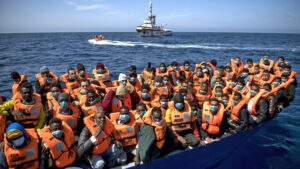When the histories of Europe are written, they will write at length about Lampedusa. This small Italian island has become not only the barometer for the permanent migration crisis which now defines the continent’s condition, it has become the metaphor for our political and ethical response to it — even a whole new era of migration.
What began as a trickle in the early 2000s had, by 2011, become a flood, when, in the aftermath of the Arab Spring, tens of thousands of migrants arrived on the island. Lampedusa very quickly came to represent a sort of inverse Ellis Island: the unwanted arriving in a country from which millions had once left. So much so that Pope Francis chose to visit it in 2013 to show solidarity with the arrivals. Ten years ago, a Libyan fishing boat carrying more than 500 people sank off its coast. Last month, more than 12,000 migrants, twice the island’s population, arrived by sea. The decade has felt, to Lampedusa’s inhabitants, like a new chapter in history.
But how different is this chapter? In France, Germany or Italy, footage, often from Lampedusa, plays in the news studios. There is a pattern to what happens next. The host then introduces his guests. After casting them as the Right and the Left, the pundits will then be pitted against each other, to answer a simple question: what does this migration mean?
Their answers are often the same. For those on the Right, the migration flows are a historical break — in their scale, nature and intensity. They require “Fortress Europe”. For those on the Left, they are nothing of the sort, but part of a long history — both colonial or gastarbeiter. It is fundamentally more of the same, requiring, if not open, then flexible borders.
A historical lens is more rewarding. It was in the early Seventies that the British literary critic John Berger understood that Europe was being remade by immigrant labour. Together with Jean Mohr, he wrote A Seventh Man, a psychological portrait of a gastarbeiter in continental north-western Europe. The title itself reflects the importance that migrants already had in the European economy: even then, one in every seven manual labourers in Germany was born abroad.
The first striking difference is the process itself. Berger’s migrants were recruited by government agencies — Germans seeking Turks — with their transport organised from the fringes of Europe to its centre. Control not chaos. The European state was in the driving seat. That is not how it feels in Lampedusa: here, the migrants themselves have driven the migration. The work of countless individuals — the officials call them smugglers — who have built up the routes. The European state feels as confused and powerless as to Berger it seemed strong.
But it is the different nature of the migrants that is most striking. Berger’s reporting led him to build an everyman in 1975 that is more reminiscent of a rural-to-urban migrant in 1875 than a passenger through Lampedusa in 2023. His subjects are uneducated rural men — from the village, clueless about the city, without words, politics or a worldview that will help them navigate their destinations.
Reading A Seventh Man and comparing it with my own recent reporting, I was struck first by the huge continuity in the scale of the migrant economy. Already, according to the statistics in Berger’s dispatch, some 25% of industrial workers in France, Switzerland and Belgium were foreigners. But then I was hit by the psychological difference. Because the hundreds of migrants I interviewed were not village boys.
If I were to construct, as Berger did, an everyman, a Lampedusa Man, he would come from the lower middle class that has emerged in Africa and Asia. They almost always speak some English. They have WhatsApp, a Facebook account and a smartphone — though they might have traded it on the way. They were born in the city. They have grown up watching Friends and The Simpsons. And they certainly have a politics: both a keen sense of their country’s exploitation at the hands of the West, but also a longing for the freedom they believe only Western institutions can guarantee them. The same applies whether or not they are refugees.
Unlike the men Berger and Bohr painstakingly photographed, there is no expectation, or even myth, of return. Those young men, in 1975, talked of feeling ripped from their natural environments — a premodern Turkish or Portuguese village. For the young man arriving on Lampedusa, it feels rather different. This 20-something Nigerian or Egyptian is as much a product of the internet as his European counterpart; entering the developed world is partially a homecoming.
Yet his destination is as changed by the internet as himself. The journey’s end of Berger’s everyman was the Fordist factory, and he liberally quotes Marx, Engels and the unvarnished words of Henry Ford himself to describe their conditions. The point Berger was making would have been obvious to his readers. The fundamental conditions of the industrial working class had not changed much since the late-19th century. They were still the proletariat, but of a different nationality.
This is not how our Lampedusa Man has come to experience Europe. Now, a few years on from his arrival in Paris or Berlin, he is to be found cycling for Deliveroo or delivering for Amazon. He has no foreman; there are no line workers; there is no weekly dance. He is alone, inhabiting a technological structure he cannot see and does not understand.
Berger spends much of his book castigating the trade unions for not extending solidarity to the gastarbeiters. This can only be read with a certain sadness today. The shoulder-to-shoulder life of the urban working class that Marx would have recognised — full of weak ties woven across the city and Christmas cards for the milkman — no longer exists. For Lampedusa Man, his experience of the city is provided by an app, which becomes more and more enraged as it hurries him to a door that eventually opens to no eye contact.
Above all this hangs Europe’s shifting geopolitics. It is true that, 50 years ago, there were already 11 million migrants in north-western Europe. It is also true that the migrant and his life have changed utterly. But the deeper change is about Europe’s position in the world.
When John Berger wrote A Seventh Man, he did so at the start of a revolution in public and political concern for human rights. This was part of a bigger trend, as the struggle for human rights around the world replaced class or national struggle as the great cause of a Western Left-liberals.
The same decade would see the breakthrough of Amnesty International, the organisation’s membership leaping from 15,000 in 1969 to 200,000 by the end of the Seventies. It saw both the group and the Soviet dissident Andrey Sakharov awarded the Nobel Peace Prize. The two were intertwined: as political incentives to push human rights in the Soviet Union grew, it dovetailed with a growing public campaign which ended up reinforcing Western geopolitics. It drove an increasing radicalism in call and response, between the public and politicians, which fuelled interventions in Afghanistan, Iraq and, of course, Libya.
Ten years on, Lampedusa confirms that this historical era is over; that the prioritisation of human rights and the priorities of European politicians no longer align. The recent visit of European Commission chief Ursula Von Der Leyen with the Italian Prime Minister Giorgia Meloni stands in stark contrast with that of Pope Francis a decade ago. Their visit was part of a wider flurry of Mediterranean diplomacy with Tunisia — a neat distillation of a new geopolitics which has turned democracy on its head to try and curb migration.
Visiting Tunisia, European leaders have dangled more than €1 billion to support the increasingly autocratic leader Kais Saied, who, facing immigration pressure himself, has embraced anti-black rhetoric about “hordes” and “the Great Replacement” — supposedly of Arabs by Africans. This is a sharp shift from 2011, when European leaders welcomed a revolution in Tunisia and joined a US-led intervention in Libya. Today they are buttressing authoritarians. Where they once welcomed European pressure on North African autocrats, human-rights NGOs now decry Europe’s partnership with a regime which has practised desert “push backs”.
Even so, it seems likely EU governments will be forced to hand over more money, as their voters demand hard borders and Africa’s population soars. It is easy, for instance, to imagine Meloni and Le Pen’s recent call for “a naval blockade” being succeeded by a demand for boots on the ground to enforce what North African border guards have promised.
But this is not the only way the pressure to disconnect human rights from foreign policy will grow. When it comes to China, in order to compete for influence, Western governments led by the US are also downgrading human rights. Consider Equatorial Guinea, led by the notorious Obiang kleptocracy, where, in order to prevent the installation of a Chinese Naval base, the Biden administration was forced to send a senior National Security Council aide to deliver gifts for its leaders, including a silver platter, with the US national deal. The same pattern can be seen from India and Turkey to the Philippines.
Meanwhile, decarbonisation, the geopolitical implications of which have yet to be fully understood, entails a whole new set of relationships in which Europe will be compelled to talk less about human rights. Essentially, pursuing Net Zero requires a global mining revolution for critical raw materials such as lithium and cobalt — and Europe, it appears, is poorly endowed in these. To ensure regular supplies, it will be forced to downgrade human rights while forming a whole set of new ties with emerging mining states from Indonesia to the Democratic Republic of Congo.
There is, therefore, nothing inevitable about the centring of human rights in Europe. They didn’t precede our current era, nor will they succeed it. Perhaps, as we think of the rocky coves of Lampedusa, and the growing indifference to the thousands that land there, or who die trying, it is not a question of whether we will fail to see them in the future. Lampedusa is telling us we are already close to blind.
Disclaimer
Some of the posts we share are controversial and we do not necessarily agree with them in the whole extend. Sometimes we agree with the content or part of it but we do not agree with the narration or language. Nevertheless we find them somehow interesting, valuable and/or informative or we share them, because we strongly believe in freedom of speech, free press and journalism. We strongly encourage you to have a critical approach to all the content, do your own research and analysis to build your own opinion.
We would be glad to have your feedback.
Source: UnHerd Read the original article here: https://unherd.com/





